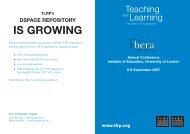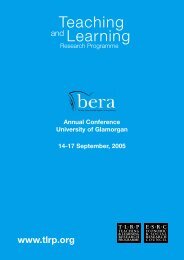The Socio Cultural and Learning Experiences of Working Class ...
The Socio Cultural and Learning Experiences of Working Class ...
The Socio Cultural and Learning Experiences of Working Class ...
Create successful ePaper yourself
Turn your PDF publications into a flip-book with our unique Google optimized e-Paper software.
home once their lectures or other academic<br />
commitments had finished. In addition,<br />
their family, childcare or employment<br />
commitments meant that they had little time<br />
for such ‘extras’. Crucially, the lives <strong>of</strong> the<br />
Northern (working class) students did not<br />
revolve around the university, <strong>and</strong> the same<br />
applied to students at Eastern College. <strong>The</strong><br />
Northern <strong>and</strong> Eastern students had a more<br />
homogeneous experience than that <strong>of</strong><br />
students from Southern <strong>and</strong> Midl<strong>and</strong>. It<br />
differed little from their social experience <strong>of</strong><br />
life before university. <strong>The</strong>ir experience was<br />
echoed by that <strong>of</strong> two <strong>of</strong> the South Asian<br />
students at Midl<strong>and</strong>. <strong>The</strong>y tended to<br />
socialise with other South Asian students,<br />
not necessarily by choice.<br />
Belonging <strong>and</strong> fitting-in, a central theme in<br />
much work on widening participation, is<br />
more nuanced <strong>and</strong> complex than has been<br />
thought. It involves students’ identities both<br />
as learners <strong>and</strong> socially. At Northern, the<br />
working class students fitted in socially with<br />
some ease. But as learners, several who felt<br />
passionate about their subject <strong>and</strong> were<br />
committed <strong>and</strong> hard-working felt they were<br />
at odds with their peers, who tended to be<br />
more instrumental learners <strong>and</strong> had a laissez<br />
faire attitude to turning up <strong>and</strong> doing the<br />
work. On the other h<strong>and</strong>, working class<br />
students at Southern, whilst at times<br />
anxious <strong>and</strong> overwhelmed by the social<br />
aspects <strong>of</strong> Southern, are <strong>of</strong>ten comfortable<br />
academically. On going there they can<br />
find their academic <strong>and</strong> learner identities<br />
validated. <strong>The</strong>y are surrounded by other<br />
“nerdy geeks,” as they themselves were<br />
labelled at school. For Midl<strong>and</strong> students<br />
there is more diversity in all respects, <strong>and</strong><br />
therefore more opportunity for students to<br />
find their niche <strong>and</strong> meet people with whom<br />
to identify.<br />
Students can succeed without participating<br />
in university social life. But the social<br />
opportunities provide the opportunity for<br />
students to access information from peers,<br />
<strong>and</strong> increase their dispositions to learn <strong>and</strong><br />
progress in new ways. For middle class<br />
students, the social experience appears to<br />
be central to their motivation for going to<br />
university. <strong>The</strong> university experience is more<br />
holistic for them than for working class<br />
students. For this group, university is about<br />
opening up opportunities; meeting new <strong>and</strong><br />
different people <strong>and</strong> developing their identity.<br />
For these students the university provides<br />
the field in which they can enhance their<br />
privileged selves <strong>and</strong> extract greater value<br />
than hitherto, not just in terms <strong>of</strong> their<br />
subject <strong>of</strong> study, but also in terms <strong>of</strong> social<br />
<strong>and</strong> cultural capital. By contrast, many <strong>of</strong> the<br />
working class students do not have the time<br />
for this, don’t have the opportunity, or don’t<br />
perceive the merits <strong>of</strong> this activity.<br />
Major implications<br />
Given the structural inequalities that exist<br />
between HEIs <strong>and</strong> the institutional effect that<br />
impacts on students’ learner identities <strong>and</strong><br />
learning opportunities, policy makers need<br />
to address the unequal funding streams<br />
that exist between pre <strong>and</strong> post 1992<br />
universities as well as between further <strong>and</strong><br />
higher education. Policy makers also need<br />
to arrest the apparent drift back towards a<br />
binary division between the different types<br />
<strong>of</strong> university. This could go some way to<br />
counteracting the hierarchical <strong>and</strong> <strong>of</strong>ten in<br />
some cases negative, perceptions that exist<br />
about different HEIs.<br />
<strong>The</strong> working class students in our study<br />
have complex lives <strong>and</strong> for many, depending<br />
on which university they attend, the<br />
university experience is not central to them.<br />
Participation in the universities differs quite<br />
markedly between students, depending<br />
on the these circumstances. In some<br />
universities, the experience is central to the<br />
lives <strong>of</strong> the students <strong>and</strong> wholly absorbing.<br />
Elsewhere, the student experience was<br />
only one part <strong>of</strong> their already busy lives,<br />
frequently as a result <strong>of</strong> financial pressures.<br />
Students therefore need more financial<br />
support so that they do not have to take<br />
paid employment whilst studying. Also,<br />
universities need to reach out more actively<br />
to these students to bind them in <strong>and</strong><br />
provide acculturation into the university<br />
experience.<br />
Processes <strong>of</strong> change,<br />
compliance <strong>and</strong><br />
resistance in the<br />
constructions <strong>and</strong><br />
re-constructions <strong>of</strong><br />
identities<br />
Our initial concern was that students<br />
regarded as the working class Other would<br />
be unlikely to identify themselves as such. In<br />
fact, all <strong>of</strong> the case study students identified<br />
themselves as working class or as having a<br />
working class background. Most expressed<br />
pride in their class identities <strong>and</strong> in their own<br />
achievements, given the struggle against<br />
hardship <strong>and</strong> structural inequalities they had<br />
experienced. <strong>The</strong>re was awareness <strong>and</strong><br />
experience <strong>of</strong> class prejudice intersected by<br />
race <strong>and</strong> gender, particularly in relation to<br />
masculinity. <strong>The</strong> students expressed a sense<br />
<strong>of</strong> difference <strong>and</strong> not fitting in, but also<br />
asserted that they are not prepared to<br />
accept that this makes them inadequate<br />
or inferior.<br />
<strong>The</strong> working class students in our study<br />
demonstrated great resilience <strong>and</strong><br />
commitment to their studies. Universities<br />
<strong>and</strong> policy makers need to address the<br />
admittedly unintentional construction <strong>of</strong><br />
working class students as high risk, or<br />
problematic learners.<br />
Prior school <strong>and</strong> other learning experiences<br />
are important in helping to prepare students<br />
for university, including the need for high<br />
expectations <strong>of</strong> working class students.<br />
Widening Participation initiatives need to<br />
reflect on the strategies currently employed,<br />
<strong>and</strong> on which pupils are targeted. More<br />
work needs to be done at primary level <strong>and</strong><br />
secondary schools need to provide more<br />
information <strong>and</strong> advice about how young<br />
people can realise their aspirations.<br />
Students deconstruct <strong>and</strong> reconstruct their<br />
social <strong>and</strong> class-related identities. Some<br />
distance themselves from the old version<br />
but most seek to manage multiple versions<br />
<strong>of</strong> themselves, creating hybrid identities.<br />
Universities need to be mindful <strong>of</strong> the<br />
diversity <strong>of</strong> needs, cultures <strong>and</strong> ways <strong>of</strong><br />
being amongst their student body <strong>and</strong> they<br />
need to adapt to their student body, whilst<br />
maintaining high expectations <strong>of</strong> their<br />
students <strong>and</strong> seeking to enable them to<br />
maximise as holistic experience as possible.<br />
to manage multiple or hybrid versions <strong>of</strong><br />
themselves. <strong>The</strong>re are also particular ethnic<br />
<strong>and</strong> gender dimensions to this.<br />
For all students, wherever they are based,<br />
the university experience is undoubtedly<br />
one <strong>of</strong> change <strong>and</strong> also <strong>of</strong> challenge. <strong>The</strong><br />
students in our research are at the sharp<br />
end <strong>of</strong> both <strong>of</strong> these dimensions. But for<br />
most, it is clear that the university experience<br />
has been agentic <strong>and</strong> <strong>of</strong>ten liberating. <strong>The</strong>y<br />
have been enabled to define their identities,<br />
gain a sense <strong>of</strong> control over their lives <strong>and</strong><br />
enjoy the opportunity to express themselves<br />
as intellectuals. It has provided a relief from<br />
family pressures, even if only momentarily,<br />
<strong>and</strong> shown them that “people like me are<br />
capable <strong>of</strong> going to university”.<br />
Social <strong>and</strong> cultural experiences at university<br />
make students confront their own difference<br />
both in the university <strong>and</strong> at home. Through<br />
this process they deconstruct <strong>and</strong><br />
reconstruct their identities. Some distance<br />
themselves from their old self, but most seek<br />
Teaching <strong>and</strong> <strong>Learning</strong> Research Programme<br />
www.tlrp.org

















